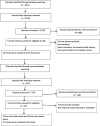Status of Nordic research on simulation-based learning in healthcare: an integrative review
- PMID: 30002918
- PMCID: PMC6032768
- DOI: 10.1186/s41077-018-0071-8
Status of Nordic research on simulation-based learning in healthcare: an integrative review
Abstract
Background: Based on common geography, sociopolitics, epidemiology, and healthcare services, the Nordic countries could benefit from increased collaboration and uniformity in the development of simulation-based learning (SBL). To date, only a limited overview exists on the Nordic research literature on SBL and its progress in healthcare education. Therefore, the aim of this study is to fill that gap and suggest directions for future research.
Methods: An integrative review design was used. A search was conducted for relevant research published during the period spanning from 1966 to June 2016. Thirty-seven studies met the inclusion criteria. All included studies were appraised for quality and were analyzed using thematic analysis.
Results: The Nordic research literature on SBL in healthcare revealed that Finland has published the greatest number of qualitative studies, and only Sweden and Norway have published randomized control trials. The studies included interprofessional or uniprofessional teams of healthcare professionals and students. An assessment of the research design revealed that most studies used a qualitative or a descriptive design. The five themes that emerged from the thematic analysis comprised technical skills, non-technical skills, user experience, educational aspects, and patient safety.
Conclusion: This review has identified the research relating to the progress of SBL in the Nordic countries. Most Nordic research on SBL employs a qualitative or a descriptive design. Shortcomings in simulation research in the Nordic countries include a lack of well-designed randomized control trials or robust evidence that supports simulation as an effective educational method. In addition, there is also a shortage of studies focusing on patient safety, the primary care setting, or a combination of specialized and primary care settings. Suggested directions for future research include strengthening the design and methodology of SBL studies, incorporating a cross-country comparison of studies using simulation in the Nordic countries, and studies combining specialized and primary care settings.
Keywords: Integrative review; Nordic countries; Simulation-based learning.
Conflict of interest statement
Not applicableNot applicableThe authors declare that they have no competing interests.Springer Nature remains neutral with regard to jurisdictional claims in published maps and institutional affiliations.
Figures
References
-
- Kohn LT, Corrigan J, Donaldson MS. To err is human: building a safer health system. Washington, D.C.: National Academy Press; 2000. - PubMed
-
- Griswold-Theodorson S, Ponnuru S, Dong C, Szyld D, Reed T, McGaghie WC. Beyond the simulation laboratory: a realist synthesis review of clinical outcomes of simulation-based mastery learning. Academic Medicine: Journal Of The Association Of American Medical Colleges. 2015;90:1553–1560. doi: 10.1097/ACM.0000000000000938. - DOI - PubMed
-
- Kunst E, Mitchell M, Johnston A. Manikin simulation in mental health nursing education: an integrative review. Clinical Simulation in Nursing. 2016;12:484–495. doi: 10.1016/j.ecns.2016.07.010. - DOI
LinkOut - more resources
Full Text Sources
Other Literature Sources
Miscellaneous




